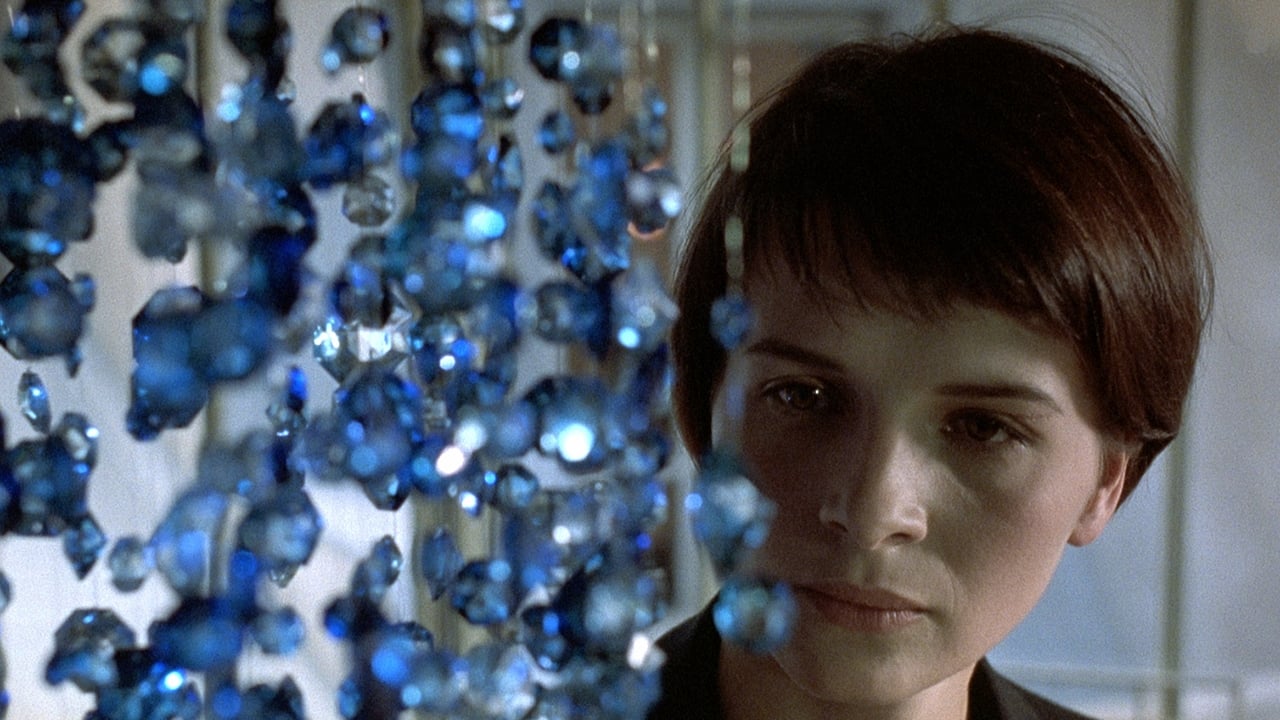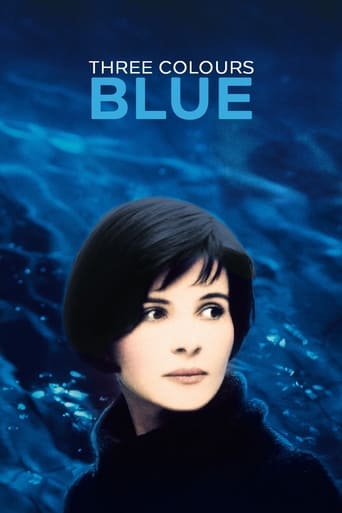

That was an excellent one.
... View MoreGreat visuals, story delivers no surprises
... View MoreGood , But It Is Overrated By Some
... View MoreDon't listen to the Hype. It's awful
... View MoreKieslowski was true poetic filmmaker, a visual storyteller, one who believed in the intelligence of the audience. His three colors trilogy came at a point in his career when he was absolutely at the height of his powers. He had just made Dekalog and The Double Life of Veronique before and the three colors trilogy would be his last great works. The trilogy begins with blue, a story of a women who suffers a great tragedy and her grieving process. The film begins with an accident ,in which her famous composer husband and young daughter are killed in a car crash ,that she survives. The way in which she deals with her grief is unexpected and very sad. At first she thinks about taking her own life but can't go through with it, then she decides to try to erase all things and people that remind her of them. She attempts to liberate herself from her past but this turns out to be difficult, the unfinished song of her husband is always playing in her head, haunting her. She is also meets with a boy who witnessed the crash, meets a mistress of her husband and has a relationship with her husbands best friend. This is the type of film that takes you inside the mind of a character. She attempts to shut out the world and just exist but as she heals and realizes how important connections with people are, she grows and the ending is beautiful and hopeful. The movie is beautiful image after beautiful image and Juliette binoche's performance is one of the best I've ever seen, she's so understated, she says a lot with her face without speaking a word. Binoche somehow is able to convey several emotions with one look, she's really incredible. The movie is covered in the color blue, as you expect, the cinematography is beautiful as in all of Kieslowski's work, each film in the trilogy is shot by a different cinematographer and has a different look like the dekalog. What impresses me most about about Kieslowski's work is the way his story's unfold so unpredictable and also his camera placement,Their is so many impressive shots in this movie. Few directors instantly involve you in a story like Kieslowski, he drops you right in and where he takes you is always interesting, complex ,unexpected, and very rewatch able. You could watch blue again and again and pick up on new things each time. Blue is a excellent film and I highly recommend it and really all of Kieslowski's work is great, he was truly a great artist.
... View MoreA 6/10 only because of the color work, however the rest of it has visually aged - overlong pointless shots, overly insistent blaring "sad" music, blacking out of the screen - supposed to represent the emotional state, however when you have a unemotional dummy of the caliber of Binoche, who could win a contest for the female equivalent of "best show of emotions" since Steven Segal and Keanu Reeves, then not even blacking out of the screen can save you.Overal - an unreal imaginary story - seriously - giving away your house to your husband's mistress just because she has a child, in France - sorry, but french people are accountants and engineers - they would kill themselves before they give so much as a pence to a person who has, especially by the tacit French morality, no claim whatsoever on that money - set in unreal imaginary France ,going as far as to swim out of lanes in a public pool - we get it, Mr. Director, Julie is a "rebel" who arranges her own life, in the face of nonexistent social opposition to her rearranging the said life, who refuses convention, by being conventionally rebelious, but NO swimming pool in Paris will allow you to swim like that - you'll get ejected and banned for life.Also in immediately selling and throwing away all the deceased's possessions she, and thus the director, is following the convention of "healthy grieving"- that is the absence of grieving of the 90ies to the tee. So much for the rebeliousness!Second - I have an issue with Julie being sad because her husband died - that is no mention of her (presumably) child, while hers being a clearly dysfunctional family clearly on the road to divorce. In the end - it's just not believable and there is nobody (except "the whore", and as an aside - thanks social development that we, at least in most of the developed world, moved away from prying into people's private lives to the point of actually causing them harm in their public lives), who has any, ANY appeal in this story.If you like the pretence of style over Substance of Camus' "Stranger" you will like that movie, or if you like an unintentional comedic jumpscare horror with 2 creepface men and 1 resting assface woman as a protagonist - this movie is for you, for the rest - avoid and watch modern American drama.Sadly in this movie I feel I can see the beginning of the fall of the European cinema from making movies close to life, to being just another socialist Soviet Union cinema which exists solely because it's funded by the government and the "cultivated" class through lobbying.
... View MoreHow do we know what it is, essentially, that we liked about a movie? Which is to say, what do we know about this viewer who was affected by something he saw and it rang a chord? And what do we say of that experience, do we ascribe it outside of us?This is what we have here, questions of memory and meaning. A woman as viewer of a movie (played by Binoche as placid observer) taking spontaneous shape around her, that pokes holes in herself and provokes questions; finally overcoming it by being pulled forward by what was left incomplete in it.A woman who has lost everything as the film begins, every anchor in her life violently removed in one swoop and she's now cast adrift. We have the whole film as her own inner drift through an interminable flow. Kieslowski evokes this with lush dissonance between visual segments, cuts and fades that leave life in suspense. There is scant story, all about living with these fragments. Music erupts around her in sudden intervals; but music that's coming from inside of her and being hallucinated.It's the world of memory and inner life. Tarkovsky enters this with long, mystifying sweeps of the camera that lift bearings and slip into dreams and ruminations. Kieslowski by contrast caresses their outline, the surface of emotions as they glide over the eye. It's not difficult like Tarkovsky or Ruiz can be, but pleasant in the way of Kar Wai. It goes down rather easy, you can see it for just the surface shift.Kieslowski had spent the whole 10 hours of the Dekalog training this ability to dream in advance. It pays off here. Each of the 10 Dekalogs was about a narrative that an earth-shattering revelation comes along and creates a change in viewing. You will see this here obviously. But Dekalog had a contrast; some of it was Kieslowski opening corridors in the imagining with his camera, most was characters stumbling into revelations and articulating feelings. Here it's resolved in favor of the eye; the whole is about visual slippage through cracks in story.He lets blue lights shine on screen as music soars in crescendos, he gives us closeup shots of eyes; the eye that colors. At other points he introduces memory as images before a viewer: the funeral playing on a screen, images of her husband on TV that when shuffled through reveal a mistress. Most eloquently, images on TV of someone being cast over a void with a bungee chord as her anxiously precarious drift with nowhere to hold. She's fading from even the mind of her mother.For the end he reserves a tableaux of joined moments from lives as they are suspended briefly in mind. It's all being endlessly relived and combined like the music she works to complete with her composer friend. The music is central here. Not just as the memory of what was collaboratively lived with her composer husband, the emotion that was absorbed and now erupts again, but also as the sheet where an incomplete piece beckons for the work of continued imagination. The shot of this sheet as scribbled notes end and lines stretch interminably is the abstract heart at the bottom of it.Had another woman not made a copy of the score, it would have disappeared when she burnt it. Had she come by to pick up the photos of her husband, she might have burnt them with everything else and never found out about the mistress. But it's all this what pulls her out of herself.
... View MoreA very engaging drama.Three Colours: Blue is the first in director Krzysztof Kieslowski's Three Colours trilogy. The story of a woman who suffers an immense tragedy and how she deals with it. Very real, human and relatable. You can see how she meticulously, and sometimes even callously, discards her old life, starts again and tries to close herself off from reminders of her past. A great study in human reaction to tragedy.Doesn't have a very satisfactory ending, however. After all the careful build-up, the ending feels rushed and too open-ended. I kept waiting for a moment of clarity that never came.Solid performance by Juliette Binoche in the lead role.
... View More